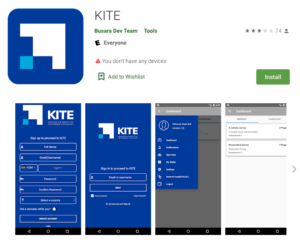Fariha Raisa, Feedback Labs | May 13, 2021
Have you ever felt that academic research, especially behavioral experiments, does not really have real-world applications?
You probably questioned the generalizability of the findings. Your intuition is not far off since the majority of the sample pool includes individuals from Western, formally educated, Industrialised, wealthy, and Democratic societies. The Busara Center for Behavioral Economics was established, to help address this issue as an advisory and research organization focused on applying behavioral science in emerging markets. With the pursuit of poverty alleviation, Busara applies rigorous research methods and evaluation tools to enable partners to improve program design, assess existing interventions, and optimize internal processes.

KITE is a one stop platform to gather behavioral insights from participants of surveys, experiments & campaigns.
Research is often deemed a slow-moving machine that is costly, time-consuming and requires a big effort. To shift this paradigm and show that traditional research methods can be complemented with findings that are collected in a fast and nimble way, Busara created a proprietary platform called Knowledge and Insights Tool for Experiments (KITE), a system for managing participants registration/recruitment and invitations, that can also be deployed remotely.
Short for Knowledge and Insights Tool for Experiments, KITE can be downloaded with an Android phone from Google Playstore. The app can then be used to join Busara’s participant database, fill out surveys, and participate in campaigns, experiments, and polls. Busara has embedded this tool in work with their partners to answer questions such as testing incentives for community health volunteers and understanding resilience during COVID-19. As Busara is scaling the tool’s rollout, they came to LabStorms to get perspectives on the remote collection of feedback, access to communities without internet access, and presenting easily communicable findings.
Key Takeaways:
- Verifying identity remotely for collecting feedback. Since the survey collection is remote, it has been challenging to confirm if the right person is filling out the survey. LabStorm attendees suggested focusing on the legitimacy of the feedback instead of verifying who the respondent is. Furthermore, as Busara has an incentive system to reimburse people for their time and effort spent in participation, attendees pitched ideas to vary the incentives. Previous studies were mentioned that claimed that people were more likely to give feedback and continue to engage on the platform when they got the detailed report on how their feedback was used and was a more effective incentive than airtime. Experimentation with the incentives was also recommended to find the sweet spot between so much that people are incentivized to give junk data compared to enough so they actually do fill it out.
- Inclusion of community members without phones or internet access. As Busara aims to include people who might not have access to the platform, it was suggested to seek opportunities with local partner organizations to engage users beyond or outside the platform. Attendees pitched ideas about IVR-based surveys/modules that could be relevant for regular and panel surveys. Deploying AI/ML-enabled surveys can have voice-based responses, and the subsequent questions could be organized dynamically. In addition to that, attendees emphasized leveraging the community orientation of low-income groups to ensure retention. When the users see their peers on the platform, they are likely to participate in the discussions and remain active.
- Communicating research findings. The challenge of building rapport with the community has worsened due to COVID and the lack of physical space. As Busara aims to strengthen social relations and close the feedback loop, attendees came up with several ideas. Firstly, videos or infographics could be used to present findings more interestingly than using complex data. Story-telling and highly visual content can be helpful to feed the information back to participants and keep people engaged. Secondly, getting someone from the community involved in the project will help design how to best explain the findings to the community, especially in rural areas. Lastly, attendees recommended letting people know initial changes that start to come up and notifying users every time there’s a ripple of success. The addition of social features to the app was also discussed to engage the users.
Following the spontaneous conversations in LabStorm, Busara focuses on building social capital in the community by developing long-lasting relationships with them. Furthermore, they would consider incorporating different platforms like open source tools and voice-based surveys to make the process more inclusive. The session was wrapped up, emphasizing closing the loop by sharing with the community how their feedback was used.
This LabStorm reminded us that impact measurement is an adaptive process. In order to figure out if their radio program is making a difference in behaviors around coronavirus, the ICRC will have to adjust their technology over time, learn which questions work, and experiment with ways to measure behavior change. If you have a great idea for ICRC to measure the impact of their program, please reach out to [email protected]!
Learn More the Presenter
Anisha Singh is the Director for Research and Innovation at the Busara Center for Behavioral Economics where she leads the portfolio of experimental research and is interested in all things research methods and data. Busara is the bridge between academia and consulting, as well as, focusing on developing a network of decision labs to contribute to evidence-based approaches in the Global South.
Anisha also leads the development and implementation of creative and innovative research products – at the core of this is exploring what it means for data to be inclusive and how to conduct research that supports the dignity of research participants.
Learn More About Busara Center for Behavioral Economics
Busara Center for Behavioral Economics is an advisory and research organization that utilizes behavioral science to help clients develop, evaluate and implement behavioral, economic, and social interventions in the Global South. Busara’s approach prioritizes rigor, relevance, and creativity, and relies on deep collaboration with clients and partners across a variety of sectors, including government, the private sector, international organizations, NGOs, and academics.
Founded in 2013 and headquartered in Nairobi, Kenya, Busara is currently active in more than 20 countries across Africa, Latin America and Asia. Busara has worked extensively to develop novel methods and tools, and a unique experimental approach to understanding behavior across the Global South.
Learn More About LabStorms
 LabStorms are collaborative problem-solving sessions designed to help organizations tackle feedback-related challenges or share what’s working well in their practice.
LabStorms are collaborative problem-solving sessions designed to help organizations tackle feedback-related challenges or share what’s working well in their practice.
Presenters leave the experience with honest, actionable feedback and suggestions to improve their feedback processes and tools.
To learn more about participating in a virtual LabStorm, please visit feedbacklabs.org/labstorms. If you are interested in presenting at a future LabStorm, please email [email protected].









